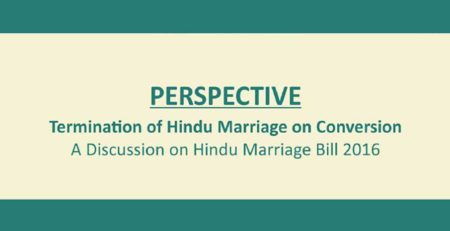The Law of Tawhin-i-Risalat: A Social, Political and Historical Perspective
Blasphemy law in biblical religions: A comparison
The principles on which the law on insulting the Prophet (‘alayhi as-salam) is based have nothing to do with the concept of blasphemy in Western countries and, therefore, needs no comparison. Still it will be just to trace the history of the blasphemy concept in the West. This analysis is necessary because most of the critics of this law in Pakistan try to understand it in the light of the history of blasphemy in the West.
The excesses committed both by the Christian Church and State under the pretext of blasphemy helped built a gradual reaction against it, which eventually led to its virtual repeal in some countries and nominal existence in others. The Church had styled itself not only as Jesus’ successor but also his substitute and thereby representing God. It considered any difference with its views as blasphemy inviting severe punishment. The now famous phrase “you do not do what I desire”24 is indicative of the Church’s attitude in this regard. Such an attitude closes all doors of independent knowledge and meaningful inquiry. With the decreasing level of scholarship in the clergy and their increasing political power, they branded every view not consonant with their policies as blasphemy and heresy. The state became instrumental in extending and consolidating the influence of the Church by its faithful implementation of the latter’s directive. In 1553, England’s Queen Elizabeth got some people burnt alive because they believed that Jesus Christ was not God, and that little children need not be baptized.25
The word blasphemy is Greek in origin. Literally, it means speaking evil, slandering, or defaming. Although in common parlance, it is used for an impious speech or remark against religion or God. The Encyclopedia of Religion and Ethics defines it as a sin and an ecclesiastical offense peculiar to Jewish and Christian religions and to allied monotheistic cults. In the Judeo-Christian tradition, however, it is viewed as a verbal offense against sacred values or beliefs declared by the Church to be the values and beliefs of Christianity. It is of significance to observe that a view based on an honest interpretation of the biblical text could also amount to blasphemy and heresy if it did not conform to the official church. Such a departure was considered “treason against God.”26 However, the scriptural basis found in Old Testament as well as New Testament do not give such sanctity to the opinion of the Church. The Bible clearly prohibits reviling God: “You shall not revile God”27 It gives death punishment for cursing the name of the Lord. “He that blasphemeth the name of the Lord, he shall surely be put to death, and the congregation shall certainly stone him.”28 There are some other references as well, which justify severe punishment for speaking against God, or reviling His name. In contrast, a non‑Muslim reviling God in a Muslim state is not liable to death sentence prescribed for insulting the Prophet. Muslim jurists have discussed the logic of this differentiation between the two acts.
However, the blasphemy concept has never remained fixed in the Christian tradition. It has ranged from the ancient Hebrew crime of cursing God’s ineffable name to irrelevant statements outraging religious sensitivities. Blasphemy varies from society to society and from time to place, but whatever is condemned as blasphemy is always regarded as an abuse of liberty and reveals what a society will not tolerate. To illustrate the kinds of acts and utterances considered blasphemous in the history of Christianity, we may refer to the following:
- Cursing, reproaching, challenging, mocking or denying Jesus.
Posing as Jesus.
Claiming to be equal to him.
Asserting powers or attributes that belonged to him.Ascribing evil or immoral inspiration to any work of God or of the Holy Spirit that moved Jesus.
Denial or renunciation of faith.
Discord or dissent from the teachings of Jesus.29
It is important to note that most of these acts are considered as denial or renunciation of the Christian faith.30 Interestingly, most of the preceding acts and utterances made in respect to the Prophet Muhammad (‘alayhi as-salām) are not considered his insult and, if committed by a non‑Muslim do not constitute a crime. For example, if a non‑Muslim denies Muhammad’s prophethood, he is not liable to punishment under this law, as he is not guilty of insulting him. Likewise, a non‑Muslim dissenting from one of his teachings is not guilty of insulting him as long as he does not use derogatory remarks. It means that the Christian application of the law of blasphemy was much more extensive than the law of shātim‑i rasūl (insulting the prophet) in Islam.
The Judeo‑Christian concept of blasphemy has influenced the development of law on this subject in the West. In 1611, when the U.S. State of Virginia codified its first ever law, it provided death penalty for blaspheming the trinity or the Christianity as such. Other American states followed suit. Punishments included fine, branding, whipping, deportation and imprisonment awarded for lesser crimes or to criminals of higher social rank.31 During the Age of Enlightenment, though the number of cases under the blasphemy law decreased, the punishments awarded included boring a hole through the tongue.32
Most important, while giving judgments under this law, the judges in England and America were guided largely by the same considerations that reigned supreme in the minds of the Muslim jurists. For example, in 1676 a farmer, John Taylor, committed blasphemy by reviling both Christianity and Jesus. Chief Justice Matthew Hab of the Kings Bench ruled that the secular courts had jurisdiction of blasphemy and could punish blasphemers; and that Christianity is part of the law of the land; and that the state has to prevent the dissolution of the government and religion.33
The last ruling is particularly significant because this shows that the crime of reviling Jesus was construed as an effort to dissolve the government and religion.
Some Western writers acknowledge the right to punish blasphemers for the followers of other religions as well. Carl W. Ernst, a contributor to the Encyclopedia of Religions, admits that “the Judeo‑Christian religious tradition holds no monopoly on the concept of blasphemy. Every society will punish the rejection or mockery of its gods. Because blasphemy is an intolerable verbal violation of the sacred, it affronts the priestly class, the deep‑seated beliefs of the worshipers and the basic religious values that a community shares.”34 To him, blasphemy constitutes a litmus test of the standards a society feel it must enforce to preserve its religious peace, order, morality, and above all, salvation. Wherever organized religion exists, blasphemy is a taboo. Judge Ernst holds that the death penalty is the last resort to control this heinous crime.






